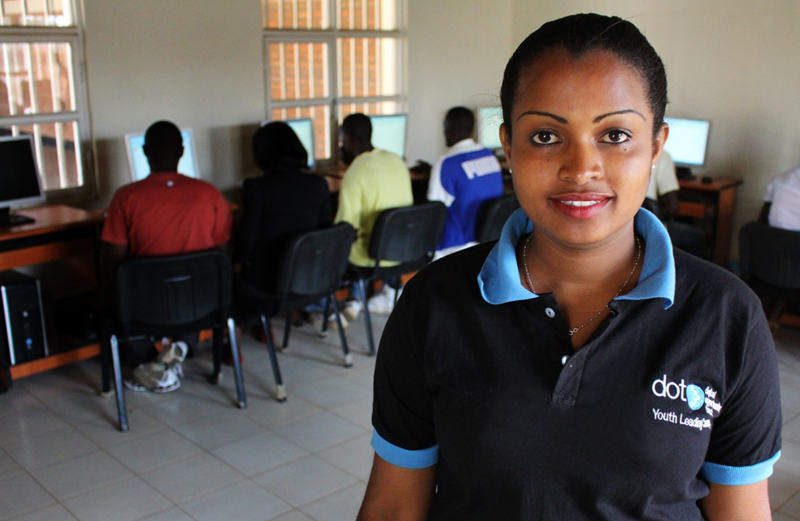Youth Delivering digital skills at scale


Institution: Digital Opportunity Trust (DOT)
Africa’s youth––the world’s largest potential workforce––need to be prepared for the digital disruptions transforming the future of work in their countries. As governments become increasingly digital, and economies dependent on ICTs, the nature of work itself will be changed, and youth need to be prepared and supported to access and create the jobs of the future.
The Digital Skills at Scale model aims to support employment and economic growth by positioning youth as leaders of community, and digital transformation.
In Rwanda, DOT is working alongside the Rwandan government to spread digital skills and grow digital literacy throughout the country –– led entirely by youth. This implementation of DOT’s Digital Skills at Scale model is called the Digital Ambassador Program. The national program is led by Rwanda’s Ministry of ICT and Innovation and implemented by DOT; the program increases the digital literacy of Rwandan citizens, as well as their access and use of online systems and services. Responding to the reality that the penetration and use of digital technologies and services remain low, the program is an essential component of the government’s Digital Talent Policy within its umbrella ICT strategic plan – the Smart Rwanda Master Plan. The Digital Ambassador Program also aligns with the World Economic Forum’s Internet for All initiative.
DOT places youth at the centre of community economic development while providing youth with critical training in job skills, digital skills, leadership, and innovation. DOT’s identifies and hires unemployed and underemployed youth with a passion for community change into an eight-month youth leadership incubator, through which they receive blended face-to-face and online training in digital skills, facilitation skills, and community mobilization. During this time, they are also supported to develop a social initiative that solves a community challenge.
While participating in the youth leadership incubator, young people are deployed to deliver basic ICT training to others in their communities––helping marginalized people in urban and rural areas access digital services such as e-government, e-learning, fintech, the Internet and social media, enabling communities to harness the socio-economic benefits of the digital economy and driving digital adoption.
The model delivers a “triple-impact.” First, access to skills training drives digital inclusion, and youth develop the skills they need to participate in the digital economy. Second, many young people leverage their new skills to start their businesses or social enterprises focused on digital innovation. Third, governments become more effective as more citizens access and use digital services. In this way, DOT harnesses the power of youth leadership and innovation to drive social and economic growth through digital disruption.
Additionally, the model drives growth at the systems level: ICTs are accelerators of economic growth, fostering innovation and entrepreneurship, expanding the market for products and services and supporting the growth of small and medium-sized enterprises. DOT’s Digital Skills at Scale model demonstrates the potential for macroeconomic impacts related to closing the gender digital divide and enhancing the economic inclusion of young women.
-
110 youth have trained 40,000 citizens to use digital tools and services in Rwanda.
-
75% of participants improved their ability to use ICTs, including fintech and e-government services, leading to impacts on livelihood and economic productivity.
-
87% of participants saw gains in their household income as a result of their new digital skills.
-
Efforts to bridge the gender digital divide through promoting digital skills and enhancing the social and economic inclusion of women has improved capacities to sustain women-led businesses.
-
Youth have acquired full-time employment as a result of their participation in the program, and are acting as “intrapreneurs”––using digital to innovate within traditional wage-earning sectors.
-
DOT has a full evaluation strategy for the model that includes tracking and follow-up.
-
Qualitative results include enhanced leadership abilities, improved social innovation and entrepreneurship skills, facilitation skills, problem solving and critical thinking.
Success Factors/Enablers
-
By mobilizing youth as the implementers of the programme, DOT’s work ensures sustainability and positions young women and men as job creators and future drivers of growth in the digital economy.
-
DOT takes an innovative cross-sectoral approach to its work to enhance the sustainability and local relevance of its digital literacy, employability and entrepreneurship development initiatives
-
Recognizing the importance of existing policies, regulations, and ways of working, DOT builds collaborative relationships with relevant stakeholders at the local, regional, and national levels to secure buy-in and ensure alignment with development priorities.
-
The Rwandan implementation demonstrates that positive impact extends across all stakeholder groups
-
Poor mobile network and Internet connections limiting the ability to fully participate in training. Despite the country’s impressive Internet penetration rates, the price of data packages and low rates of smartphone ownership continues to hinder many citizens from accessing it. In response, the youth established partnerships with district level representatives from the Ministry of Information Technology and Communications, who were able to help secure access to computer labs or centers. The youth lent their laptops and smartphones to the citizens who did not have. Finally, the establishment of Citizen Digital Community Clubs helped citizens share devices among one another to continue to practice and develop their skills once the formal training period had ended.
-
Managing training needs and goals of diverse groups of citizens:The project aimed to connect the unconnected. However, differing levels of literacy and experience made it challenging to deliver the same programme to this diverse audience. Some citizens learned slowly, and required extensive one-on-one coaching, frustrating the more advanced participants who wanted to move more quickly.
-
The Rwandan government has invested in scaling the program further, with goals to reach millions of citizens throughout the country. Stakeholder involvement includes policy and outreach support from the World Economic Forum; support from ITU’s EQUALS initiative; a gender-equality framework created by the Web Foundation; the integration of Mozilla’s peer-to-peer Digital Club model; and sustainable long-term ownership of the initiative by the Rwandan government. This multi-sectoral approach leads to sustainable, locally relevant impact that targets critical national and regional goals for digital development.
-
DOT has recently signed a Memorandum of Understanding with Côte d’Ivoire’s Ministry of Economy to design an adaptation of its Digital Skills at Scale Model based on the best practices learned in Rwanda. There is additional interest in localized adaptations of the Digital Skills at Scale model in South Africa and Cameroon. DOT continues to explore opportunities to implement its Digital Skills at Scale model, which has proven highly replicable and scalable, with government partners based on the success of its adaptation in Rwanda.
-
Website: http://dotrust.org
-
Executive Summary of the Digital Ambassador Program Proof of Concept Evaluation: https://www.dotrust.org/media/2019/06/2019-01-04-DAP-Proof-of-Concept-Final-Evaluation-Executive-Summary.pdf
-
#CaseforChange video campaign about the Digital Ambassador Program, in partnership with GSMA: https://www.caseforchange.com/case-studies/how-women-are-taking-the-lead-in-rwanda
-
Profiles of DOT youth and their innovations: https://rwanda.dotrust.org/dotyouth/

